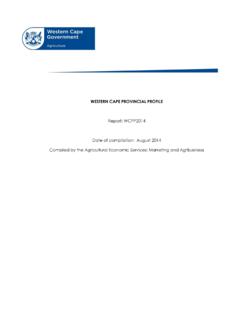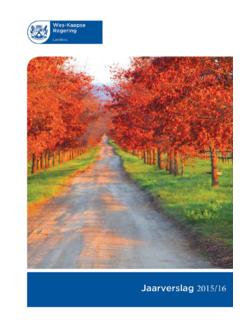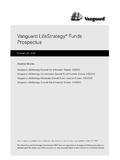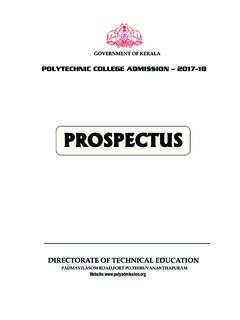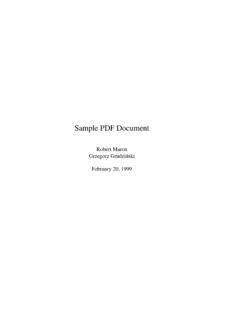Transcription of Elsenburg Prospectus: Higher Certificate
1 Elsenburg prospectus : Higher Certificate 1 prospectus : Higher Certificate Elsenburg Agricultural Training Institute 2015 Elsenburg prospectus : Higher Certificate 2 CONTACT DETAILS All correspondence must be directed to: Head: Student Affairs Elsenburg Agricultural Training Institute Private Bag X1, Elsenburg , 7607 Tel.: +27 21 808 7700 Fax: +27 86 687 9255 E-mail: Website: Applications Applications on the prescribed application form must reach the Institute by or on 30 June of the preceding year of study. Application forms are available from the Registrar, or on the Elsenburg website. All applicants must, if required, complete the standardised tests of the Stellenbosch University. Student number On receipt of new applications the Institute office assigns a unique number to each applicant that serves as identification of the individual concerned so as to simplify future communication.
2 The student number must be used in all future correspondence with the Institute. Other contact details Stellenbosch University: Faculty of Agriscience Elsenburg prospectus : Higher Certificate 3 +27 21 808 9111 Department of Agriculture: Western Cape +27 21 808 5111 Other training centres Clanwilliam: +27 27 482 1362 Outeniqua (George): +27 44 874 8080 Oudtshoorn: +27 44 279 4086 PLEASE NOTE 1. The Elsenburg Agricultural Training Institute reserves the right to amend the prospectus at any time. 2. Management of the Elsenburg Agricultural Training Institute accepts no liability for any inaccuracies there may be in the prospectus . Every reasonable care has, however, been taken to ensure that the relevant information to hand as at January 2017, the time of going to press, is given fully and accurately in the prospectus .
3 Elsenburg prospectus : Higher Certificate 4 TABLE OF CONTENTS ACADEMIC RULES: Higher Certificate .. 13 GENERAL STIPULATIONS FOR THE Higher Certificate PROGRAMME .. 13 ADMISSION REQUIREMENTS .. 13 ATTENDANCE AND ABSENTEEISM OF LECTURES, PRACTICALS, TESTS AND EXAMINATIONS .. 15 AUTHORISED ABSENCE FROM LECTURES, PRACTICALS, TESTS AND EXAMINATIONS .. 16 DETERMINATION OF THE PREDICATE MARK (EXAMINATION ADMISSION MARKS) .. 17 EXAMINATIONS .. 18 PASS REQUIREMENTS .. 20 CONDONATION .. 21 REPETITION AND CONTINUATION OF THE MODULES .. 21 HOSTEL RESIDENCE .. 28 PROGRAMME FOR Higher Certificate .. 29 STUDY OPTIONS .. 29 CONTENT OF MODULES .. 31 AGRIBUSINESS MANAGEMENT (ABM) .. 31 AGRICULTURAL ENGINEERING (ING) .. 32 AGRONOMY (AGR) .. 33 ANIMAL PRODUCTION (DPR) .. 34 BIOLOGY (BIO) .. 36 Elsenburg prospectus : Higher Certificate 5 COMPUTER PRACTICE (REK).
4 37 CROP PROTECTION (GWB) .. 37 EXTENSION (VOL) .. 37 HORTICULTURE (HRT) .. 39 210 (20) Cultivation of Deciduous Fruits (8l + 6p) .. 39 230 (20) Citrus Cultivation and Pests and Diseases of Deciduous Fruits (8l + 6p) .. 40 NATURAL RESOURCE MANAGEMENT (NHB) .. 40 PRINCIPLES OF AGRICULTURAL SCIENCE (BLW) .. 40 SOIL SCIENCE (GRK) .. 41 VITICULTURE (WIB) .. 41 210 (20) Wine grape cultivation (8l + 6p) .. 41 230 (20) Integrated production of wine and Table and Raisin Grape cultivation (8l + 6p) .. 42 Other programmes offered at the Elsenburg Agricultural Training Institute .. 43 Higher Education .. 43 (three years) .. 43 Diploma in Agriculture (one year) .. 43 Further Education and Training .. 44 Elsenburg prospectus : Higher Certificate 6 Vision The Advancement of Elsenburg Agricultural Training Institute as an agricultural and educational centre of excellence to the benefit of the broader community.
5 Mission To promote sound, integrated managerial and skills training in agriculture with advanced specialisation in area specific fields of excellence informed by industry and societal needs. Elsenburg prospectus : Higher Certificate 7 Elsenburg : a proud tradition Elsenburg s history dates back to 1698, when the land was allocated to Samuel Elsevier by Willem Adriaan van der Stel, at that time the governor of the Cape colony. The farm s successive owners, among whom Martin Melck is probably the best known, built it up to one of the prime farms in the Cape. Martin Melck built the beautiful old manor house in 1761. The farm was sold to the government by the Myburgh family in 1898. On 1 September 1898 the Agricultural College, the first of its kind in South Africa, opened its doors.
6 Five students received their diplomas at the end of the first academic year (June 1899). During the first fourteen years of its existence the average number of students was 44. During the First World War, however, there was a drastic reduction in applications, with only 8 students studying there in 1915. In 1926 Elsenburg College of Agriculture and the University of Stellenbosch amalgamated and a two-year diploma course was offered at Elsenburg , with the primary aim of training prospective farmers. In 1927 this course was replaced with a one-year course, which was replaced by practical courses in 1931. In 1939 the two-year diploma course was reinstated. Elsenburg s relationship of 47 years with the University was severed in 1973 and the Department of Agriculture accepted responsibility for agricultural training at Elsenburg .
7 An important milestone in 1976 was the establishment of the Diploma in Cellar Technology. Many of South Africa s winemakers today, received their agricultural training at Elsenburg . In 1994, with the transformation to a democratic political order in South Africa, the Department of Agriculture: Western Cape was created. The Elsenburg and Kromme Rhee colleges of agriculture amalgamated. The amalgamation placed a great responsibility on the Department of Agriculture to continue and to expand the training offered. A Centre for Further Education and Training was consequently created to address the need for short, practical courses. Elsenburg prospectus : Higher Certificate 8 The relationship with the University of Stellenbosch was again initiated and since 2004 Elsenburg has been offering a programme in association with the University of Stellenbosch s Agriscience Faculty.
8 This development is in line with the government s new academic policy to give tertiary students more mobility between educational institutions. Duplication of programmes is also eliminated. Elsenburg College of Agriculture was renamed on 1 April 2004 to the Elsenburg Agricultural Training Institute. Elsenburg prospectus : Higher Certificate 9 South Africa: an agricultural gem! The creation of employment opportunities and the provision of sufficient and safe food and fibre of high quality at affordable prices are some of the demands faced by the agricultural sector. The opportunities and challenges in agriculture lie in the diversity of our topography, the variation in our soil, the divergent nature of our climatic regions, and in the expectations of demanding buyers of our agricultural products.
9 Agriculture has to maintain a balance with nature without exploiting natural resources. Our country has an astonishing diversity of fauna and flora that has to be respected, protected and conserved. The agriculturalist is dealing with living and life-giving organisms in such a way that the goal to improve the quality of life of all, will be furthered. Agriculture in South Africa contributes almost 5% to the gross national product, assists significantly in earning foreign exchange, is an important provider of employment and supplies basic human requirements in food and fibre. Agritourism is becoming increasingly important as an industry and provides an escape for many city dwellers. For each R1 million increase in the final demand for agricultural products, 83 new employment opportunities are created, in comparison with a corresponding figure of only 29 employment opportunities in the rest of the economy.
10 It is generally acknowledged that agriculture has an important role to play in poverty alleviation. Soil is an important production factor in agriculture. The Republic of South Africa extends over million hectares of which 16 million hectares are used for crop production. Around million hectares have established trees and 83 million hectares are covered by natural grazing. Soils with optimum physical and chemical conditions are scarce and localized, but there are various unique soil/climate interactions that allow for the cultivation of products for niche markets. Elsenburg prospectus : Higher Certificate 10 South Africa is a water scarce country. Around 30% of the country receives less than 250 mm rain per year, around 34% receives between 250 and 500 mm, 25% between 500 and 750 mm per year and only 1% of the country receives more than 750 mm of rain per year.


